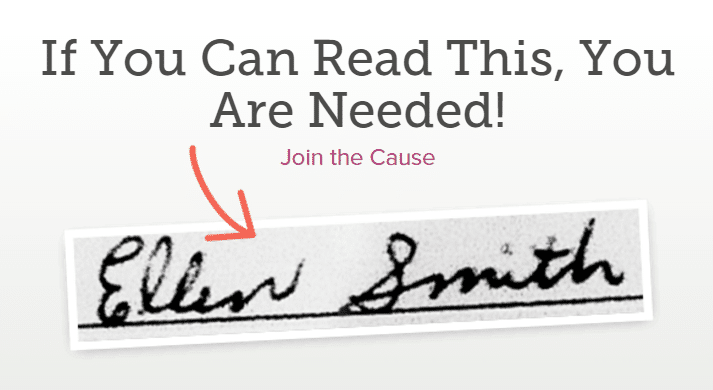FamilySearch.org, which holds the largest collection of free family history data in the world, is currently recruiting genealogy enthusiasts for its online World Indexing Event 2017. And they want you.
For 72 hours between Oct 20 and 22 thousands of family historians will gather together online to see how many records they can accurately index in an attempt to make more free family history data available online than ever before. Even if you’ve never indexed a record, or only have a small amount of time to dedicate to the event, your contribution will make a difference.
What is indexing? Why is it important?
Indexing is the important process of entering pertinent data from a scanned document into a searchable database. Every time you enter a name into a box online in the hopes of finding your ancestors you are relying on the work someone did to make that document searchable — and many, many of these people are dedicated volunteers.
Sure, computers can decipher and make searchable some typed records…but results are often inaccurate and hand written records must always be indexed by actual people. Without volunteer indexers we’d all be spending our time browsing through massive collections (assuming we could even gain access to them). And we all know how time consuming that can be. And sometimes, an online index may be the only way to access data online if the actual record is not made available publicly online, or if the record is generally unreadable to an untrained eye.
The World Indexing Event 2017 is a great way to become part of the important indexing effort. All you need is a computer (no tablets or phones) and an internet connection. To sign up for the event simply visit this page on FamilySearch and sign up. A special program is provided for indexing and documents in many languages will be available to those with both English and foreign language proficiency.
Of course, if you’re feeling especially eager about getting started you can take part in one of FamilySearch’s 100+ ongoing indexing projects right now. Many other free genealogy websites also rely on volunteer indexers so check your favorite databases for ways to contribute. And, as always, we thank those who have dedicated their time to making sure important family history records are accessible to us all.
By Melanie Mayo – Editor, Family History Daily – Originally published June 23rd 2016, updated on Oct 8th 2017 to reflect this year’s event



very interested. Did this years ago, would like to do it again.
I’m keen to become involved
Nice piece of work and very informative. Waiting for more such blogs
If one is indexing a census, then one needs an entire page or more by the same handwriter. I’ve done indexing before and was only given one household at a time, sometimes it was only two lines. If the writer had neat legible writing, it was ok, but if it looked like a chicken with ink on its feet ran across the page, it was difficult, if not impossible to decipher. I was transcribing census for my own family as the search engines for the sites failed. I went through them page by page and line by line until I found them, there were some very blatant mistakes. The checkers and double checkers also need to be given more than a line or two. The example above “Ellen Smith” is very clear, however, most records are not. Let’s hope this project isn’t rushed.
Would like to be involved.
Very interested in this
Jan Moon
I would love to take part
Would love more information.
Indexers rock! For help and support indexing difficult to read portions of records, go to the Facebook group “Deciphering Genealogy Script” where members dedicated to helping others accurately read genealogy documents work with you on them, and files in this group have extensive information to help you read & accurately decipher the text in the documents you are indexing.
Is this only for MY family tree? I tried entering info and the info was correct but it went to search right away.
Is this for LDS or Ancestry? I got a great deal of my info I was missing from LDS. Thought this was just helping do other family records which I had done years ago from registers.
Is there a specific time to participate in this indexing event (i.e. time zones, hours from-to)?